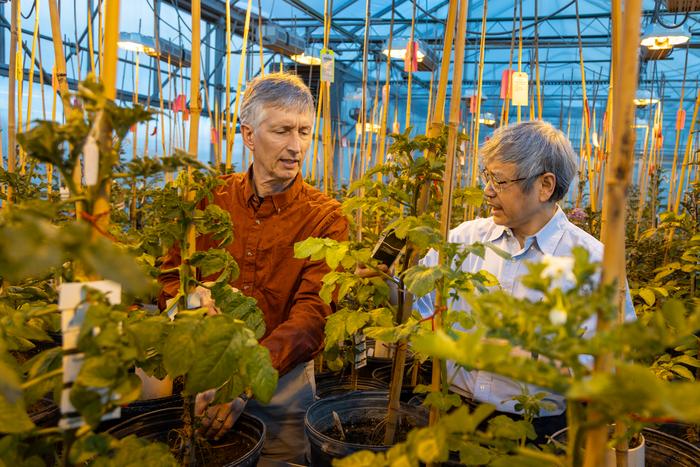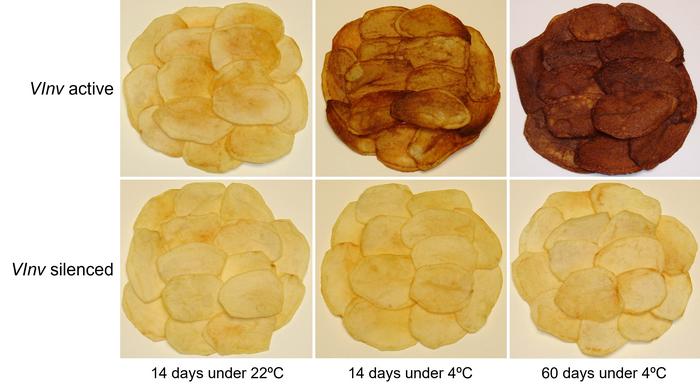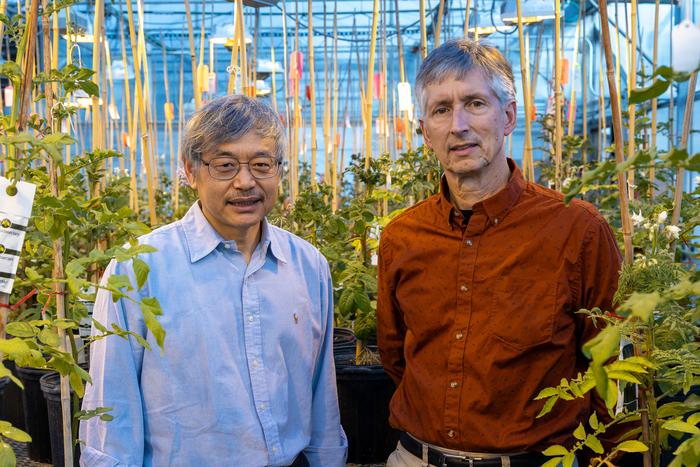Healthier potato options may be on the horizon due to gene editing
Chip, chip, hooray! A recent breakthrough in the world of potatoes could produce a healthier spud in the future.
David Douches and Jiming Jiang of Michigan State’s Potato Breeding and Genetics Program have discovered a way to store potatoes year-round without adverse effects through the use of gene editing technology. Their findings were published in the science journal, The Plant Cell in February of this year.
Douches, the director of MSU’s Potatoes Breeding and Genetics program has been working alongside Jiang for several years at MSU’s lab. Jiang’s research extends even further back to his tenure at the University of Wisconsin-Madison. But it was not until this year did they see the fruits of their labor.
David Douches
“In the potato chip industry, there’s a higher demand for cold resistant sweetening potatoes”
This discovery is especially prevalent in Michigan which boasts a $240 million dollar potato chip industry, and the state grows the most potatoes used for potato chips. On average, Michigan potato farmers grow 1.9 billion pounds of potatoes annually. The potato industry also creates 21,700 jobs and $832 million in wages, and that’s no small potatoes!
But while potatoes cannot be produced year-round, potato chips are made year round which presents manufacturers with a problem.
“This has been a problem for a long time, especially with the potato processing industry. It’s basically the most troublesome, most headaches, most cost problem for the industry,” said Jiang.
Potatoes cannot be stored at room temperature or they’ll sprout and grow eyes before they eventually rot about 1-2 months after harvest.
Cold-storing potatoes come with their own set of problems though, namely cold-induced sweetening or CIS. CIS is when the starches in potatoes, sucrose, are converted to sugars, glucose, and fructose, which leads to higher levels of acrylamide and browning.
According to the National Cancer Institute, acrylamide is a substance formed through chemical reactions in plant-based food. It forms during cooking processes such as frying and baking and also creates the dark hues seen on chips and fries.
Although acrylamide has been shown to be a carcinogen in animals, there has yet to be any concrete proof it is cancer-causing in humans. Though the FDA categorizes acrylamide as a “human health concern”
There are some alternative options to cold storing potatoes, but they are incredibly expensive and have altered the taste of the final product. This is where the research of Douches and Jiang comes in, which has been a decades-long process.
“We identified the gene that controls CIS, in 2010 further identifying the importance of the gene. I explained it like football, it’s a team sport. The gene we discovered is the quarterback, although every player on a team is important the quarterback is critical. It’s hard to win the Super Bowl without a good quarterback,” Jiang explained.
But it was not until this year that Jiang and his team were able to edit the gene, known as potato vacuolar invertase, and make a Super Bowl-ready spud. They did this through a combination of gene expression analysis, protein identification, and enhancer mapping to pinpoint the regulatory element controlling the CIS gene.
“Gene-editing allows us to go in and target specific segments of DNA, and we can go in and knock out pieces of them. In this case, it slows down the process but not shut it off completely”
David Douches
So, with the gene slowed down the tots will be healthier when baked or fried due to the lack of sugar and acrylamide. Not to mention, farmers will have less food waste and potentially lower food costs when the potatoes become commercialized. It also opens the door for flexibility in storage and transportation.
“We as breeders and geneticists have been trying to develop varieties that store longer and store colder,” said Douches.
Douches and Jiang’s goal is not to gene-edit every single potato but rather breed those that have been gene-edited to create a new species of CIS-resistant potatoes.
“Most people are not accepting of eating potatoes that may not be natural because something has been added to it or something has been taken away”.
Jiming Jiang
Before being brought to market, the potatoes have to be approved by the USDA, a process Jiang suspects will be easier to get through than with a genetically modified product. However, the work done on potatoes could be applied to other starches in the future.
What’s next for Jiang and Douches? Well, Jiang will continue his work gene editing potatoes to create the best possible product. While Douches will continue assisting Jiang and breeding his own potatoes, one of his most famous potatoes is set to receive its own line of chips this fall. So be on the lookout for purple potato chips made by Great Lakes Potato Chips.
But while we are years away from these gene-edited potatoes being mass-created and distributed, Douches said there’s one easy way to help keep you safe.
“If you see a really dark chip at the bottom of the bag, maybe just don’t eat that one”


